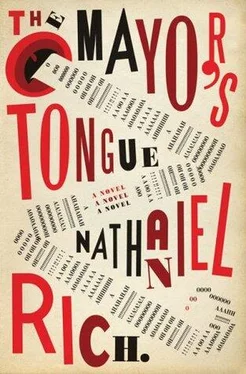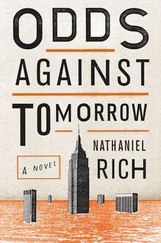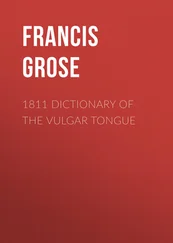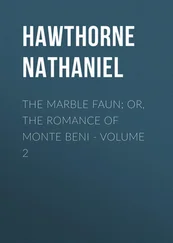Eugene turned. He noticed that one of the man's legs was made out of wood.
"I don't think so, sorry."
"We'll meet again soon enough," said the drunkard. "Remember me then."
"OK, buddy."
Alvaro gave the man a coin and pulled his friend by the arm.
"Hey," shouted the man behind them, and then he said something in a foreign language: "This is a Dominican peso." Alvaro stopped.
"He speaks Cibaeño!" shouted Alvaro.
"I saw you in Italy," said the man to Eugene, a slight southern lilt in his voice.
"I speak the language," said Eugene, turning to face him, "but I never went to Italy."
"I can see you there right now," said the man, closing his eyes.
"Have you been to Jamao?" asked Alvaro, stunned. "You have a perfect accent. But you're definitely not a native. I'm from Jamao. What are you asking my friend? I don't understand English."
"Though I am going to Italy next week," said Eugene. He wanted to keep moving but there was something about the man's drunken glare that exerted some kind of pull on him.
"I'll see you there," said the drunkard. "Not in Italy, but very near to it."
"Whatever you say, man."
"Constance will be there too," said the drunkard, turning away. "He's been waiting for you."
"He's too smashed to speak coherently," said Eugene, not recognizing the man's foreign tongue. He forced himself to start walking again, away from the river. Alvaro followed him reluctantly.
Back at the esplanade the one-legged drunk teetered to the cast-iron railing. He passed a mismatched old couple that ignored him completely, so busy were they pawing at each other.
"Love," mumbled the drunk, "cures boredom. But lust — lust cures sorrow."
With a lurch and a chuckle, the drunk hopped over the railing of the esplanade. If the couple had been able to tear themselves away from each other — or if Alvaro and Eugene had turned back toward the river — they would have observed a peculiar sight: the drunk fell end over end into the East River without making a splash, and disappeared.
Several days after Rutherford's departure for Italy, Mr. Schmitz finds himself in an unusual predicament. For the first Saturday in twenty-seven years, he has no place to go. Normally, at nine in the morning, after chugging a warm pot of coffee and crunching on a buttered croissant, Mr. Schmitz would hear Rutherford's cheerful knock at his door. They would stroll north alongside Riverside Park and turn right on 110th Street until they reached the western edge of Central Park. There they would sit on a bench overlooking the park, its sparse thin-branched trees and dirt fields, and trade stories. If their Uzbek friend Augie was at one of the stone chessboard tables, they'd amble over and take turns playing him. Whenever he captured an opponent's piece, the Uzbek master pulled a sleight of hand that made it look like he was inserting the piece into his ear: the reverse of the children's trick where an uncle pulls a coin from his nephew's ear. The Saturday before he left for Italy, Rutherford played Augie one last time, and suffered his final, demoralizing checkmate.
"Where do all the pieces go?" asked Mr. Schmitz, after the match had concluded.
"Up his jacket sleeve," said Rutherford. "Look at his elbows next time you play him. They're clunky with rooks and bishops. Those aren't bone spurs."
But Mr. Schmitz has no desire to play Augie again. When he awakes this Saturday, it is already half past nine. The coffee in the kitchen is tepid and the butter has congealed on his croissant. Agnes is waiting for him at the kitchen table, eyeing him hawkishly over the weekend newspaper. Her glance settles briefly on his hair, ribboned this way and that, and then on his undershirt, yellowed by nocturnal sweat. Mr. Schmitz realizes that he has never seen her read the paper at the kitchen table before. He wonders what else he does not know about his wife. All those missing Saturdays.
"I slept late, dear."
Agnes gives him a watery smile and returns to her paper.
As he nibbles on the croissant and politely sips the coffee, Mr. Schmitz looks around the kitchen as if for the first time. New details, previously unnoted, emerge. A brass fish mold, hanging decoratively over the oven; a photograph of unidentifiable family members in an oversize wooden frame; a wok. Has Agnes ever cooked him Chinese food?
"What do you say we go to the park today?" asks Mr. Schmitz.
Agnes does not look up from the paper. "Did it ever occur to you that I might have my own plans of a Saturday?"
"I'm sorry," says Mr. Schmitz, wounded. He takes a large bite of his croissant. Its flakes cling to his undershirt.
Agnes puts the paper down, creasing the spine in a deliberate fashion. Her face fills with something tender: affection, perhaps, or remorse.
"I would be happy to accompany you on your walk to the park," she says, like a half-asleep mother trying to calm a son who has awoken from a nightmare.
Mr. Schmitz grins and swallows the rest of his croissant.
At the edge of the park Augie is enthroned at his normal stone table, playing chess with a female Columbia student with long bangs and thick sunglasses. Mr. Schmitz points the man out to his wife.
"Whenever he takes a piece, he slips it into his ear. See?"
"That's not so bad," admits Agnes. "But really, where does he put the pieces?"
"It's actually quite clever," says Mr. Schmitz. He leans back with the pride of a man revealing a valuable secret. "He puts them up his sleeve."
He looks at his wife to catch her reaction. But instead of smiling in wonderment, she crinkles her nose as if something smells raw.
"His elbows are clunky with rooks and bishops," says Mr. Schmitz, to clarify.
"But he's wearing a T-shirt."
"Ah. So he is."
"He seems to have terrible bone spurs in his elbows," says Agnes. "He should see a doctor."
Their conversation lapses into a profound stretch of silence. Mr. Schmitz stares at the trees lining the park's perimeter, which shimmer a living green and yellow. He is used to smoking on his walks through the park, because Agnes forbids him to do so in the apartment. But with her there beside him, he can't just take out a cigarette. It is likely, he realizes, that she doesn't even know he still smokes.
When he and Rutherford fell quiet during these Saturday walks, the silences seemed tonic and comfortable. Not so with Agnes. He is not accustomed to talking at length with his wife. They eat, read, and do housework together, but these activities leave little time for meaningful conversation. Mr. Schmitz spends his days in an office he rents out at his life insurance firm, from which he retired five years earlier. He is cut off from Agnes, since the office does not have a telephone — he sliced the wire as soon as he moved in. In the evening, he reads in his study, a Beethoven symphony playing so loud that even its composer would have heard it, while Agnes putters about the kitchen, organizing coupon clippings, paying bills, and shouting (so as to be heard over the strings) to Mrs. Louhon or Mrs. Ramses on the telephone. He often spies her in the kitchen, her bottom turtlenecking through the splintering bast seat of one chair, her bulbous knees hung, like onion domes, over the back of another. When Mr. Schmitz hobbles into bed (earlier in their marriage, Agnes likened his skulking approach to the hunting ritual of the Abominable Snowman), she is already asleep. Before turning out her bedside light, he takes care to remove the crossword puzzle from under her chin, which is inevitably smudged with newspaper ink. Sometimes he grazes the edge of his forefinger against the side of her cheek, a vestigial habit that has survived the passage of decades — like his occasional stutter, his tendency to click his heels while standing in one place for any extended length of time, and his poor command of mastication. Other times, he remembers her little fingers, curled up into a fist, and he closes his eyes until sleep comes.
Читать дальше












